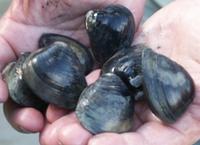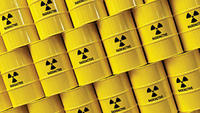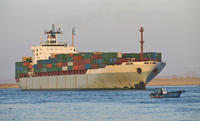-
China races to claim Arctic resources
As temperatures around the world continue to rise and the ice in the Arctic Ocean melts, the once frozen seas are increasingly open for exploration and countries have been scrambling to claim the region’s vast resources; several countries including Canada, the United States, and Russia have all sought to expand their territorial claims over the region and now new countries like China are pushing in; Chinese researchers recently sailed to within 120 nautical miles of the North Pole; only a few years prior, this trip would have been impossible due to the thick ice in the ocean that can be more than 30 feet thick; scientists estimate that during the summer months, the Arctic Ocean could be ice-free by as early as 2013 or as late as 2060
-
-
DHS information officers discuss the future of technology at AFCEA
The senior technology officials of several DHS agencies gathered for a roundtable discussion at the AFCEA Homeland Security Conference in Washington, D.C. to outline their priorities, challenges, and plans for procuring technology and implementing capabilities at their respective departments; information officers from TSA, the U.S Coast Guard, the National Protection and Programs Directorate, and Citizen and Immigration Services were present; each official expressed similar plans to increase mobile access to data, digitize records, establish national databases, and streamline the flow of information; officials believe these remotely accessible databases can also help reduce costs and enhance customer service; the officials also noted the difficulty in hiring qualified personnel with cyber security skills
-
-
Common clam to help clean oil-filled waters

Clams are bottom-dwelling filter feeders, obtaining nutrients by filtering the water around them; researchers at Southeastern Louisiana University are studying the lowly Rangia clam to determine whether the organism can contribute to helping clean oil-polluted waters
-
-
Oil giants struggle to find more oil
Last week Exxon Mobil Corp’s annual financial report showed that the world’s largest oil company was struggling to find more oil; the report revealed that Exxon had only replaced 95 percent of the oil that it pumped out of the ground over the last decade; Exxon now holds more natural gas reserves than oil for future production; the company has replaced its natural gas reserves at higher rates than oil; in recent years large western oil companies have found that most of the accessible oil fields have been tapped, while new regions have been difficult to access both technically and politically; in 2010 Chevron announced that it had only replaced one barrel for every four it produced and Royal Dutch Shell PLC recently announced that next year it will produce more gas than oil for the first time in its company’s 104-year history
-
-
States challenge federal policy on nuclear waste storage

The search for a permanent solution to the storage of nuclear waste continues as three states sued the Nuclear Regulatory Commission (NRC) last week over its new policy on spent fuel; in December NRC issued a new policy stating that nuclear waste could be safely stored at a power plant for sixty years after a reactor went out of service; the issue of nuclear storage has become increasingly contentious after the Obama administration ruled out the use of a Department of Energy storage site in Nevada in 2009; nuclear plants have been forced to turn temporary on-site storage into long-term facilities as no permanent site has been built; the Obama administration launched a commission to find alternatives for the permanent nuclear storage site in Nevada that it cancelled
-
-
Safer wind turbine developed to minimize DHS objections

In the past wind turbine farms have faced opposition from the Department of Defense (DOD) and the Federal Aviation Administration (FAA) due to the interference they cause radar systems; wind turbines distort radars causing air traffic controllers to see them as storms and the interference generated by the wind farms can even cause planes to disappear completely from radar screens; a new wind turbine model will help minimize the impact that wind turbine fields have on radars; the model will be used by various government agencies including DHS, DOD, and the Department of Energy to decide whether a proposed wind farm can move forward
-
-
Wind energy's dirty secret
Vast tracts of land have been turned into toxic wastelands to fuel the increasing demand for green energy; rare Earth metals like neodymium are critical components in wind turbines and electric cars, but the process to extract them is damaging to the environment; China, the world’s largest supplier of rare Earth metals, has largely ignored environmental considerations and left Inner Mongolia a widening sea of radioactive waste; the United States is currently ramping up production of rare Earth minerals, but is seeking to find more sustainable production methods; wind power still has fewer environmental repercussions than coal or oil
-
-
Controversial nuclear reactor design moving toward approval
A controversial new nuclear reactor design is moving ahead for approval by the U.S. Nuclear Regulatory Commission (NRC); the chairman of the NRC announced that the agency would open the design for public comment before deciding whether to approve the reactor; critics of the proposed reactor, a Westinghouse AP1000, believe that in the event of an accident its safety measures are inadequate; if approved, the reactor could be used in as many as fourteen nuclear power plants
-
-
China's nuclear power expansion is based on thorium
The thorium fuel cycles produce almost no plutonium, and fewer higher-isotope residuals; thorium is much more abundant than uranium, and the reduced plutonium output eases proliferation concerns; the energy output per ton is also attractive; China has committed itself to establishing an entirely new nuclear energy program using thorium as a fuel; six heavy-water thorium reactors are planned in India, which has the world’s largest thorium deposits
-
-
Growing worries about security of Suez Canal

More than 35,000 ships crossed the Suez in 2009, about 10 percent of them oil tankers; if the Suez Canal were to close, oil tankers would be forced to sail around southern Africa — adding some 6,000 miles to the journey; this translates to an extra twelve days traveling from Saudi Arabia to Houston; based solely on speculation and risk, experts say the price of crude oil has gone up $5.00 a barrel since Friday; U.S. officials keep silent about how the United States might respond if Egyptian officials could no longer guarantee safe passage for the tens of thousands of ships that pass through the canal each year
-
-
Offshore nuclear power plant safer against terrorists
Building nuclear power stations underwater could help protect them from terrorist attacks, according to a French company hoping to do just that; the plant would sit on the seafloor at a depth of 60 meters to 100 meters, a few kilometers off shore; the design would make the plant resistant to tsunamis, earthquakes, or floods, and its underwater position makes it less vulnerable to terrorist attacks
-
-
Marines use solar power in Afghanistan to help fuel the fight
Marines at Forward Operating Base Jackson in the Sangin valley of Helmand Province are using solar energy generators to stretch fuel supplies and save lives; with over 100 British troops killed there, Sangin valley is one of Afghanistan’s deadliest areas; since the implementation of portable solar energy generators, fuel consumption has decreased from twenty gallons to less than three gallons a day; delivering fuel is incredibly dangerous as fuel convoys are often ambushed or hit by IEDs
-
-
U.S. lacks infrastructure to increase use of ethanol fuel
Scientists at Purdue University say the United States lacks the infrastructure to meet the federal Renewable Fuel Standard with ethanol; researchers say the United States has hit the “blending wall” and lacks the ability to consume more ethanol than what is currently produced; less than 3 percent of vehicles on the road are equipped to handle ethanol fuels and there are only 2,000 pumps; the federal Renewable Fuel Standard requires nearly three times as much renewable fuel to be produced per year by 2022
-
-
Army seeks to go off the grid at Fort Bliss
At Fort Bliss Army commanders seek to power the base using renewable power sources by 2015; plans include using solar, wind, geothermal, and biomass; military bases around the country are increasingly looking at renewable energy to reduce their carbon footprint and avoid disruption in the event of a terrorist attack
-
-
Pentagon prohibited from purchasing Chinese solar panels
Obama signs military appropriations bill that prohibits the Pentagon from purchasing Chinese solar panels; the “Buy American” provision is part of a larger trade dispute with China over subsidies; the Pentagon is investing heavily in solar to reduce its energy consumption and increase fighting effectiveness; the bill is likely to raise costs for the military
-
- All
- Regional
- Water
- Biometrics
- Borders/Immig
- Business
- Cybersecurity
- Detection
- Disasters
- Government
- Infrastructure
- International
- Public health
- Public Safety
- Communication interoperabillity
- Emergency services
- Emergency medical services
- Fire
- First response
- IEDs
- Law Enforcement
- Law Enforcement Technology
- Military technology
- Nonlethal weapons
- Nuclear weapons
- Personal protection equipment
- Police
- Notification /alert systems
- Situational awareness
- Weapons systems
- Sci-Tech
- Sector Reports
- Surveillance
- Transportation
Advertising & Marketing: advertise@newswirepubs.com
Editorial: editor@newswirepubs.com
General: info@newswirepubs.com
2010-2011 © News Wire Publications, LLC News Wire Publications, LLC
220 Old Country Road | Suite 200 | Mineola | New York | 11501
Permissions and Policies
Editorial: editor@newswirepubs.com
General: info@newswirepubs.com
2010-2011 © News Wire Publications, LLC News Wire Publications, LLC
220 Old Country Road | Suite 200 | Mineola | New York | 11501
Permissions and Policies
